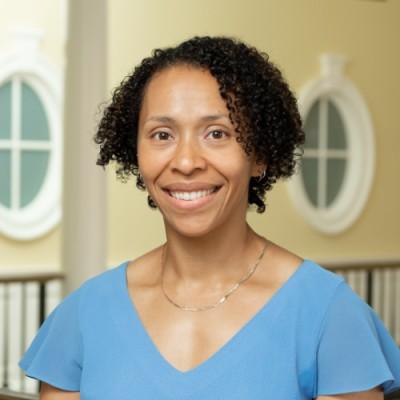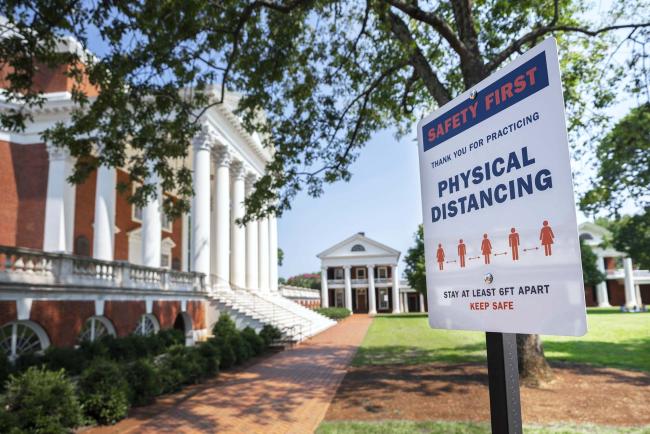Melissa Phillips
A longtime math teacher, Melissa Phillips enrolled in the residential master's program in data science at UVA in 2019, graduating in 2020. Since graduation Phillips has worked at GA-CCRi, a firm that specializes in geospatial storage, visualization, and analysis.

While in college in Ontario, Melissa Phillips knew she wanted to be a math teacher. “I love working with students,” she said.
“Learning new things is something that I always strive toward, and then being able to impart that knowledge to others and care about people as people who are trying to grow and helping them do that is really rewarding to me,” she added.
Phillips’ journey is reflective of those taken by many in the field, including a number of students at UVA, in that her path didn’t go in a straight line or check any predetermined boxes about what one needs to do to pursue a career in data science.
After a brief stint as a teacher, she went back to school to get a master’s degree in theological studies. She then moved to Edinburgh, Scotland, in 2007 while her husband was pursuing a doctorate degree, then to Charlottesville in 2010 where she resumed her career as a math educator.
While teaching at an independent school in Charlottesville, she decided to explore professional development opportunities in computer science so that she could incorporate it into her math curriculum. Soon, she was teaching her students how to code. It was at this time that she attended a math competition where a data scientist delivered keynote remarks.
“I hadn’t heard of data science until that point,” she said. The speaker described how data science combined elements of computer science, math, and domain knowledge.
“And I thought, that’s exactly what I want,” Phillips said. She discovered the graduate program at what was then still officially the Data Science Institute and enrolled in the residential master’s program in fall 2019.
She found the program and her cohort to be a great fit, and she appreciated the opportunity that her coursework provided to work closely with her classmates.
“One thing I loved about the program is it’s very collaborative, and every class had some kind of teamwork project,” Phillips said. “And so you really have the opportunity to bring your skill set and to allow other people to shine too.”
After graduating she would join GA-CCRi, a firm that works with government agencies and private sector clients to solve problems through data science and other techniques. She continues to work there now.
She encourages other students to consider the field that has become her career. “If you’re driven to find meaning in the world, then I think that data science is one way to get there.”
Phillips opted for the residential master’s program in 2019, in part because forging in-person friendships in class was important to her. While her experience at the School of Data Science began within the walls of classrooms, it would not end that way.
In March 2020, the COVID-19 pandemic upended all facets of society, and its impact was felt deeply at colleges and universities across the country.
On March 11, all UVA classes moved online, with students encouraged to return home and President Jim Ryan informing the University community that “we will not be holding classes on Grounds for the foreseeable future.”
Like the rest of the world, the School of Data Science, which was not even six months old when the shutdown began, would suddenly be forced to make dramatic adjustments.
“Phil often said during that time, ‘Building a new school is hard; building a different kind of school is harder; building a different kind of school in the middle of a pandemic is damn near impossible,'” recalled Arlyn Burgess.
Burgess added, though, that the School, despite its youth, was well positioned to weather this unprecedented disruption.
“We had a huge number of resources at our disposal, and also, data science became so important so fast in the pandemic itself,” she said, citing interest in network models and predictive analytics to track the spread of the disease.
Additionally, the School’s recent creation of an online master’s program proved even more beneficial than could have been imagined when it was conceived.
“All the residential students went into that online program,” said Phil Bourne. “So the teaching part was affected, but not as affected as badly as it could have been.”
Still, for a school that was in its infancy, particularly one whose aim was to foster collaboration, the pandemic created unavoidable challenges.
“It’s very much dependent on how people are personally interacting all day, every day,” said Bourne of the conditions needed to create the culture the School was aiming for. “And when you lose that, and everybody’s just in a Zoom window, it really affects things. When I look back on it, I’m actually surprised we did as well as we did.”
For students like Melissa Phillips, it was not the conclusion to her one-year master’s degree experience that she imagined or desired.
“It was challenging and not the way we wanted to end things because we really wanted to have that graduation moment,” she said.
Nevertheless, she credited the School for how it handled an incredibly difficult period.
“I feel like the transition was easier because of all the support we got from faculty and staff,” Phillips said.
Even though it was far from a traditional commencement, Burgess did fondly recall the poignant video remarks Bourne recorded on the steps of the Rotunda to honor the first group of master’s students to graduate since the School of Data Science had been established the year before.
Burgess remembered the moving scene and the look in Bourne’s eyes during his remarks and what she knew it signified: “The people that are getting those degrees are the future of what data science is going to be.”
The story of data science at UVA is, at its core, the story of people — faculty, staff, students, all of whom took a leap of faith to make something that had never been a reality.
It was the story of Rick Horwitz, who would leave UVA in 2014 to become executive director of the newly created Allen Institute for Cell Science. He, at an early stage, could see the potential in studying big data sets and would make the case for it to anyone who would listen at the University.
While recalling the initial period of planning the institute and building the support as sometimes stressful, Horwitz looks back on those days and the relationships he built with a smile. “It was really a lot of fun,” he said.
It was the story of Don Brown, a leading researcher and the first director of the Data Science Institute who continues to lead data science research efforts at UVA to this day.
“We can actually make a major change at this University for something that was extremely important and transformational — and that’s very exciting and satisfying to have been a part of,” he said.
It was the story of Teresa Sullivan, a groundbreaking president whose pride in the school that she helped make possible, and what it will be able to do, is evident.
“UVA is going to be able to do types of research we could not do before and to access partners we could not have access to before because we didn’t have what they needed — and now we do,” she said.
It was the story of Reggie Leonard, an early staff hire who is helping data science students become data science leaders, and Arlyn Burgess, who literally worked to build a school from scratch.
“I have had an opportunity to do more things and more experiences that I ever thought possible,” she said. “And I hope I’ve still got a long way to go in my career.”
It’s the story of Jim Ryan, a president with an eye toward the future who sees the School of Data Science as emblematic of what UVA has always been: a center for innovation.
“In some ways, it’s in our DNA,” he said.
It’s the story of Jaffray Woodriff, who knew what was possible before anyone else and through his historic gift made it so. And it’s the story of Phil Bourne, the founding dean of the first school for data science in the country, who is already thinking about the next phase for the school he leads.
“It’ll still be growing,” he predicted. “There’ll be incredible opportunities, incredible vibrance.”
“Years from now, I can stumble back here some time in my wheelchair — it’ll be great to see,” he joked.
It’s also the story of many other faculty, staff, and supporters of data science and UVA who, while not mentioned in this narrative by name, were integral to what came to be.
Ultimately, the story that will be written about the School of Data Science will be about its students, like Melissa Phillips and countless others, who are showing, and will continue to show, why this was all worth doing, what data science can achieve, and that the possibilities of a School Without Walls are truly limitless.
And it’s a story that’s just begun.


